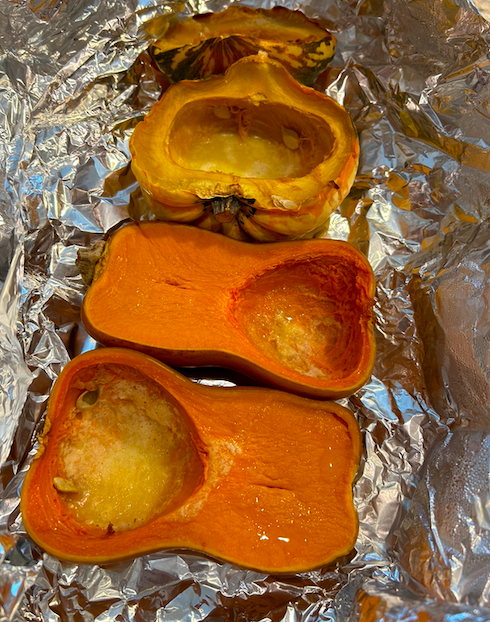Squash: A perfect Fall Ingredient
As the crisp air of fall arrives, our bodies naturally crave warmth, nourishment, and grounding foods. In Ayurveda, this is the season of Vata dosha—characterized by qualities of dryness, coldness, lightness, and unpredictability. To balance Vata, we turn to foods that are sweet, heavy, and nourishing. Squash is one of the most perfect fall foods for bringing balance and stability during this season.
From butternut to acorn to pumpkin, squash varieties are abundant in autumn. Their hearty, grounding qualities make them a seasonal staple in both traditional cooking and Ayurvedic kitchens.
Nutritional Benefits of Squash
Squash isn’t just versatile—it’s packed with nutrients that support overall health and seasonal balance:
Low in Calories – Great for weight management.
High in Fiber – Supports digestion, blood sugar regulation, and satiety.
Rich in Vitamins – Especially vitamin A (beta-carotene), vitamin C, B6, and folate.
Essential Minerals – Potassium, magnesium, and manganese for muscle, nerve, and bone health.
Antioxidants – Protect against oxidative stress and inflammation.
Hydrating – High water content keeps tissues nourished and digestion smooth.
Phytonutrients – Anti-inflammatory and protective compounds.
Squash in Ayurveda
In Ayurveda, foods are categorized by taste (rasa), qualities (guna), and their effect on the doshas. Squash’s properties make it particularly balancing during the fall season:
Taste (Rasa): Sweet (Madhura)
Qualities (Guna): Heavy (Guru), slightly unctuous (Snigdha), mildly cooling (Shita)
Effect on Doshas:
Balances Vata: Its grounding, nourishing qualities soothe Vata’s dry, erratic nature.
Balances Pitta: Its sweetness and mild cooling nature calm excess heat.
Neutral for Kapha: Best enjoyed in moderation, especially in damp, cool seasons.
✨ In short: Squash nourishes, grounds, and hydrates—making it an ideal autumn food for nearly all body types.
In Ayurveda, squash is categorized based on its taste (rasa), energetic qualities (guna), and its impact on the doshas (Vata, Pitta, and Kapha). The qualities of squash, particularly winter squash varieties like butternut, acorn, and pumpkin, are as follows:
Taste (Rasa):
Sweet (Madhura): Squash has a predominantly sweet taste, which is one of its primary qualities in Ayurveda.
Energetic Qualities (Guna):
Heavy (Guru): Squash is considered heavy in terms of its quality, which can contribute to a feeling of grounding and nourishment.
Unctuous (Snigdha): Squash has a slightly oily or unctuous quality, which adds to its nourishing nature.
Cool (Shita): While not extremely cooling, squash has a mildly cooling effect, making it suitable for balancing excess heat in the body.
Impact on Doshas:
Balancing for Vata: Squash's sweet, heavy, and unctuous qualities are particularly beneficial for pacifying Vata dosha. It helps to calm Vata's cold, dry, and erratic nature, promoting balance and stability.
Balancing for Pitta: Squash's sweet and cooling qualities can also have a soothing effect on Pitta dosha, helping to alleviate excess heat and acidity.
Moderation for Kapha: While not inherently aggravating to Kapha, it should be consumed in moderation, especially during the fall and winter seasons when Kapha tends to accumulate.
Nutritional Value:
Squash is a good source of vitamins, particularly vitamin A (beta-carotene), vitamin C, and various B vitamins.
It contains essential minerals like potassium and magnesium.
Squash is rich in dietary fiber, which aids in digestion and supports overall gut health.
My Favorite Fall Squash Varieties
This fall, I’ve been exploring different varieties that make cooking fun and seasonal eating exciting:
Honey Nut Squash – A smaller butternut variety, naturally sweet and perfect for roasting.
Tiger Squash – A striped acorn squash with a nutty, earthy flavor.
One of my absolute favorite creations is my Get Grounded Brownies, made with pumpkin, sweet potato, or squash for a rich, grounding autumn treat.
How to Use Squash in Fall Cooking
Roast with warming spices like cinnamon, nutmeg, or cumin.
Purée into soups for a creamy, grounding meal.
Bake into breads, muffins, or brownies.
Stuff acorn or delicata squash with grains and vegetables.
Spiralize spaghetti squash for a light pasta substitute.




